Gibbs Reflective Cycle: Task Reflection and Skills Development
VerifiedAdded on 2022/08/09
|10
|1911
|55
Homework Assignment
AI Summary
This assignment is a reflective paper by a student analyzing a task using the Gibbs Reflective Cycle. The paper details the student's experience, feelings, evaluation, and analysis of the task, which involved a presentation on corporate social responsibility. The student identifies the development of various skills, including research, teamwork, time management, communication, and problem-solving. The reflection highlights the student's strengths and weaknesses, discusses areas for improvement, and outlines an action plan for future tasks. The paper emphasizes the importance of self-reflection and the Gibbs model in enhancing learning and skill development.
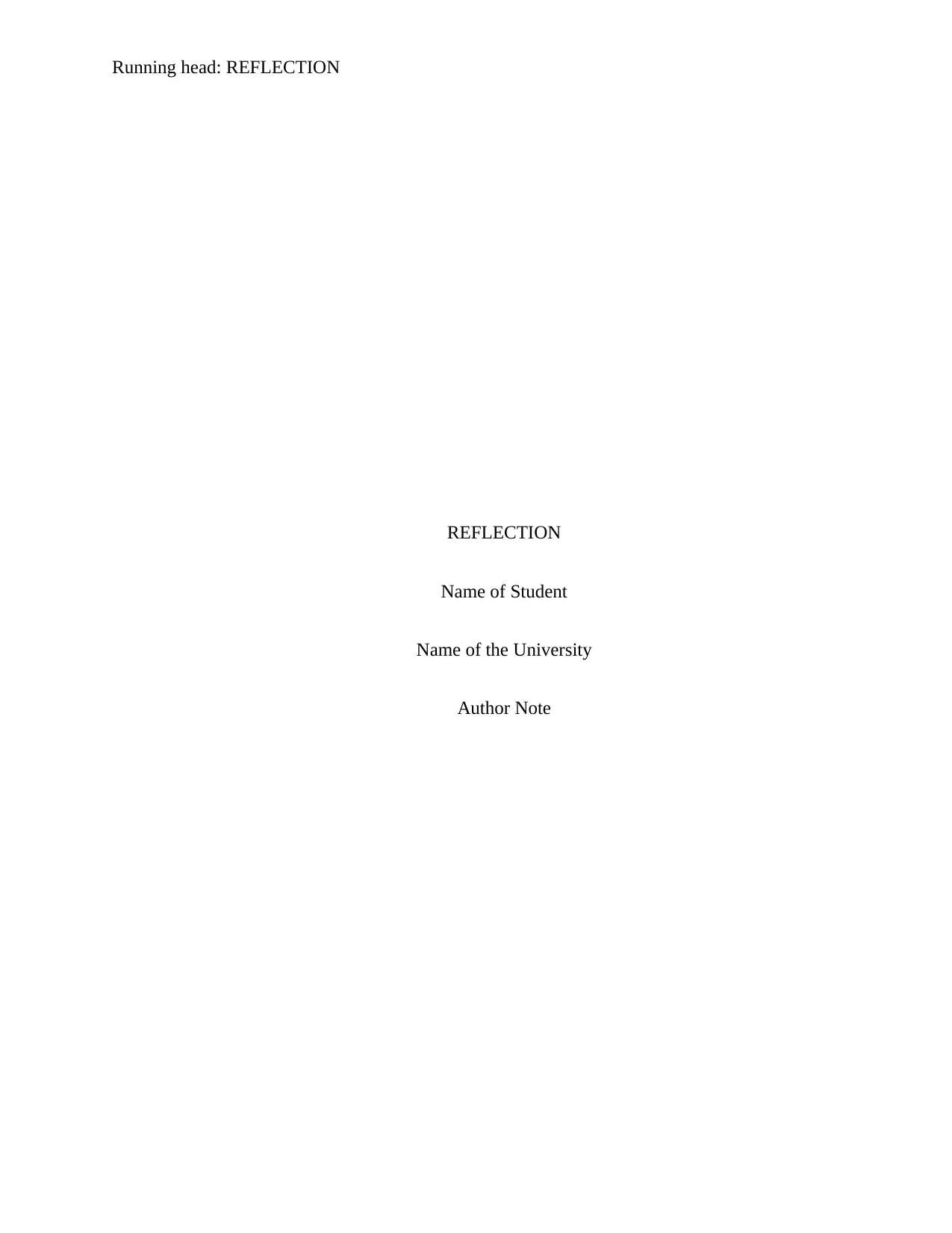
Running head: REFLECTION
REFLECTION
Name of Student
Name of the University
Author Note
REFLECTION
Name of Student
Name of the University
Author Note
Paraphrase This Document
Need a fresh take? Get an instant paraphrase of this document with our AI Paraphraser
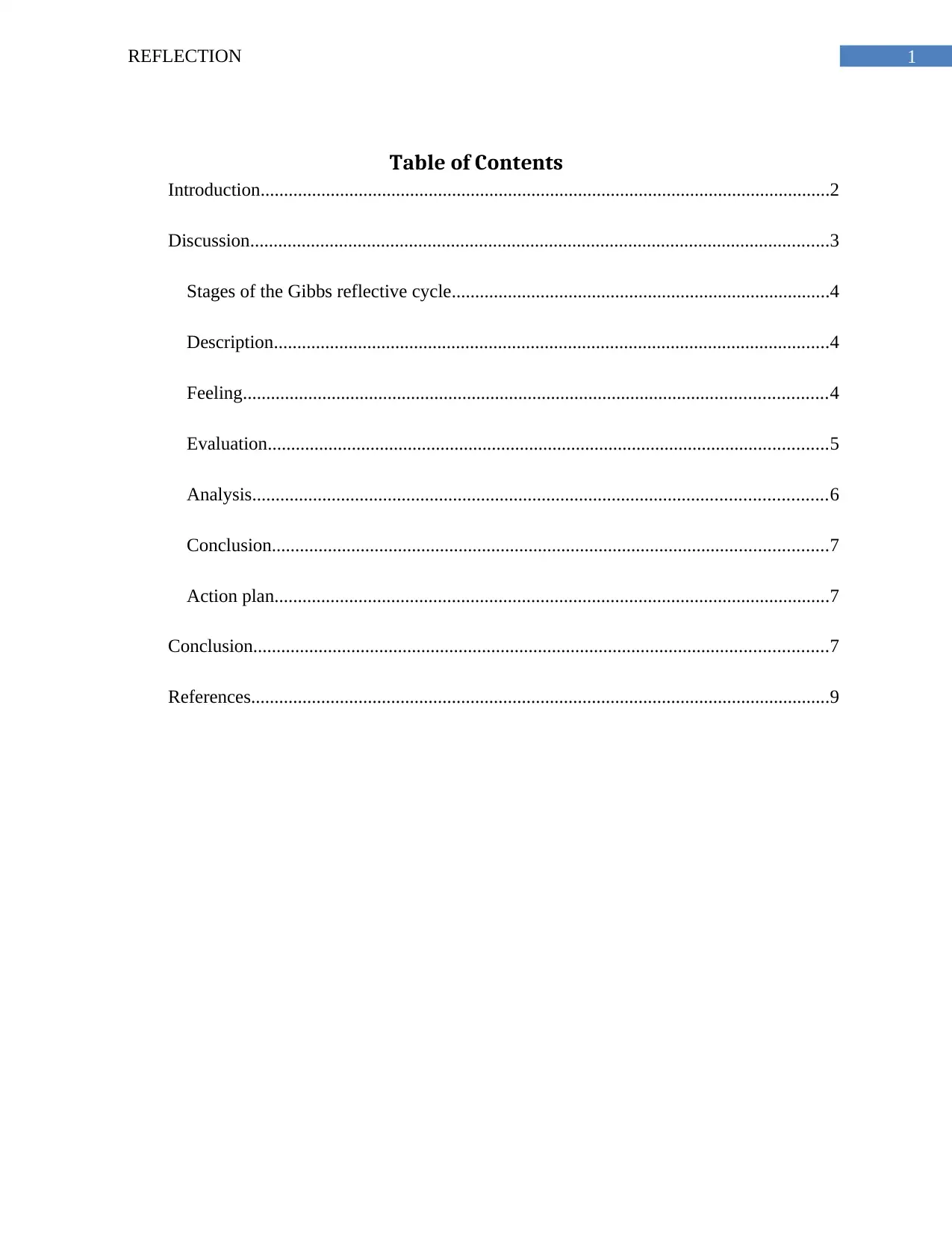
1REFLECTION
Table of Contents
Introduction..........................................................................................................................2
Discussion............................................................................................................................3
Stages of the Gibbs reflective cycle.................................................................................4
Description.......................................................................................................................4
Feeling.............................................................................................................................4
Evaluation........................................................................................................................5
Analysis...........................................................................................................................6
Conclusion.......................................................................................................................7
Action plan.......................................................................................................................7
Conclusion...........................................................................................................................7
References............................................................................................................................9
Table of Contents
Introduction..........................................................................................................................2
Discussion............................................................................................................................3
Stages of the Gibbs reflective cycle.................................................................................4
Description.......................................................................................................................4
Feeling.............................................................................................................................4
Evaluation........................................................................................................................5
Analysis...........................................................................................................................6
Conclusion.......................................................................................................................7
Action plan.......................................................................................................................7
Conclusion...........................................................................................................................7
References............................................................................................................................9
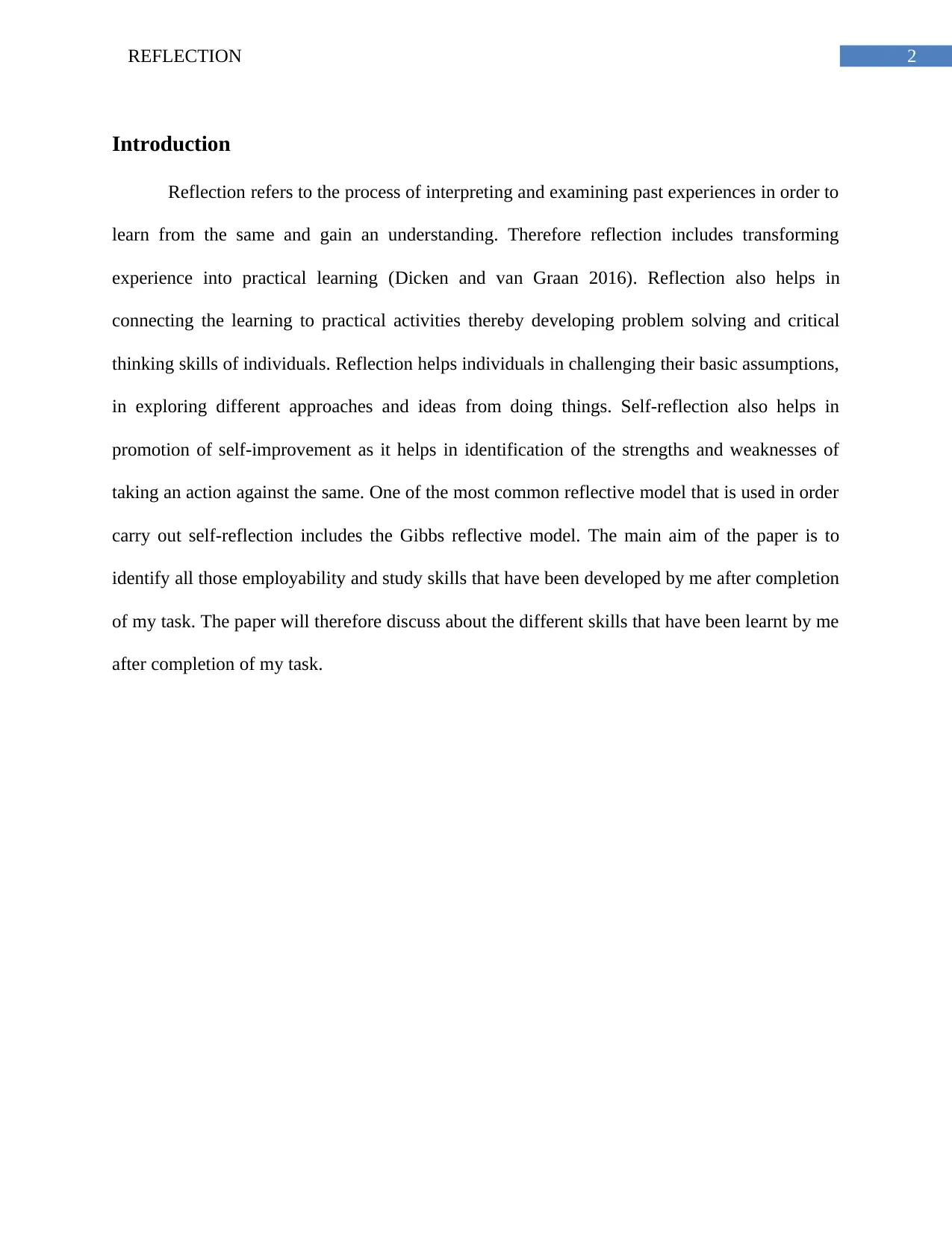
2REFLECTION
Introduction
Reflection refers to the process of interpreting and examining past experiences in order to
learn from the same and gain an understanding. Therefore reflection includes transforming
experience into practical learning (Dicken and van Graan 2016). Reflection also helps in
connecting the learning to practical activities thereby developing problem solving and critical
thinking skills of individuals. Reflection helps individuals in challenging their basic assumptions,
in exploring different approaches and ideas from doing things. Self-reflection also helps in
promotion of self-improvement as it helps in identification of the strengths and weaknesses of
taking an action against the same. One of the most common reflective model that is used in order
carry out self-reflection includes the Gibbs reflective model. The main aim of the paper is to
identify all those employability and study skills that have been developed by me after completion
of my task. The paper will therefore discuss about the different skills that have been learnt by me
after completion of my task.
Introduction
Reflection refers to the process of interpreting and examining past experiences in order to
learn from the same and gain an understanding. Therefore reflection includes transforming
experience into practical learning (Dicken and van Graan 2016). Reflection also helps in
connecting the learning to practical activities thereby developing problem solving and critical
thinking skills of individuals. Reflection helps individuals in challenging their basic assumptions,
in exploring different approaches and ideas from doing things. Self-reflection also helps in
promotion of self-improvement as it helps in identification of the strengths and weaknesses of
taking an action against the same. One of the most common reflective model that is used in order
carry out self-reflection includes the Gibbs reflective model. The main aim of the paper is to
identify all those employability and study skills that have been developed by me after completion
of my task. The paper will therefore discuss about the different skills that have been learnt by me
after completion of my task.
⊘ This is a preview!⊘
Do you want full access?
Subscribe today to unlock all pages.

Trusted by 1+ million students worldwide
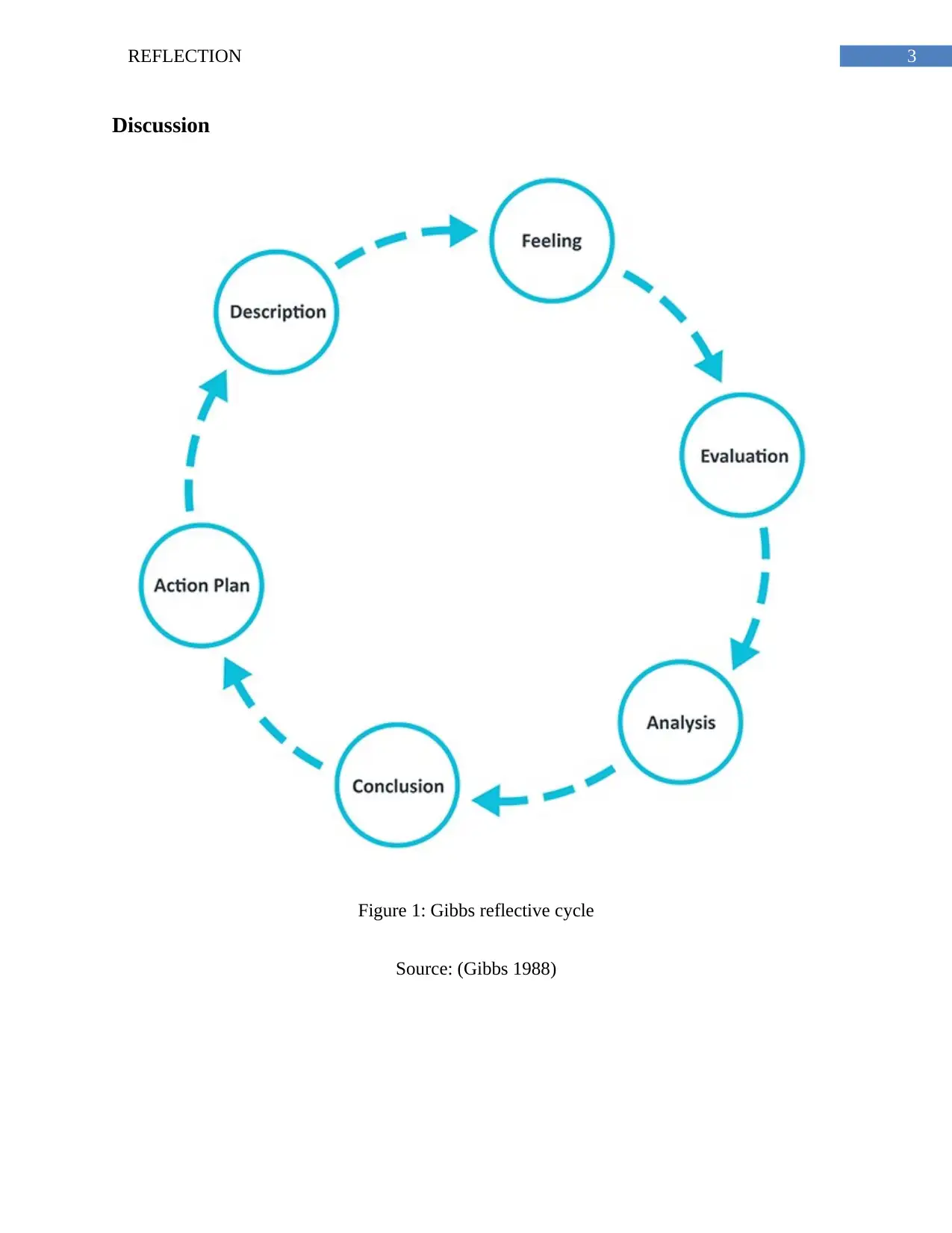
3REFLECTION
Discussion
Figure 1: Gibbs reflective cycle
Source: (Gibbs 1988)
Discussion
Figure 1: Gibbs reflective cycle
Source: (Gibbs 1988)
Paraphrase This Document
Need a fresh take? Get an instant paraphrase of this document with our AI Paraphraser
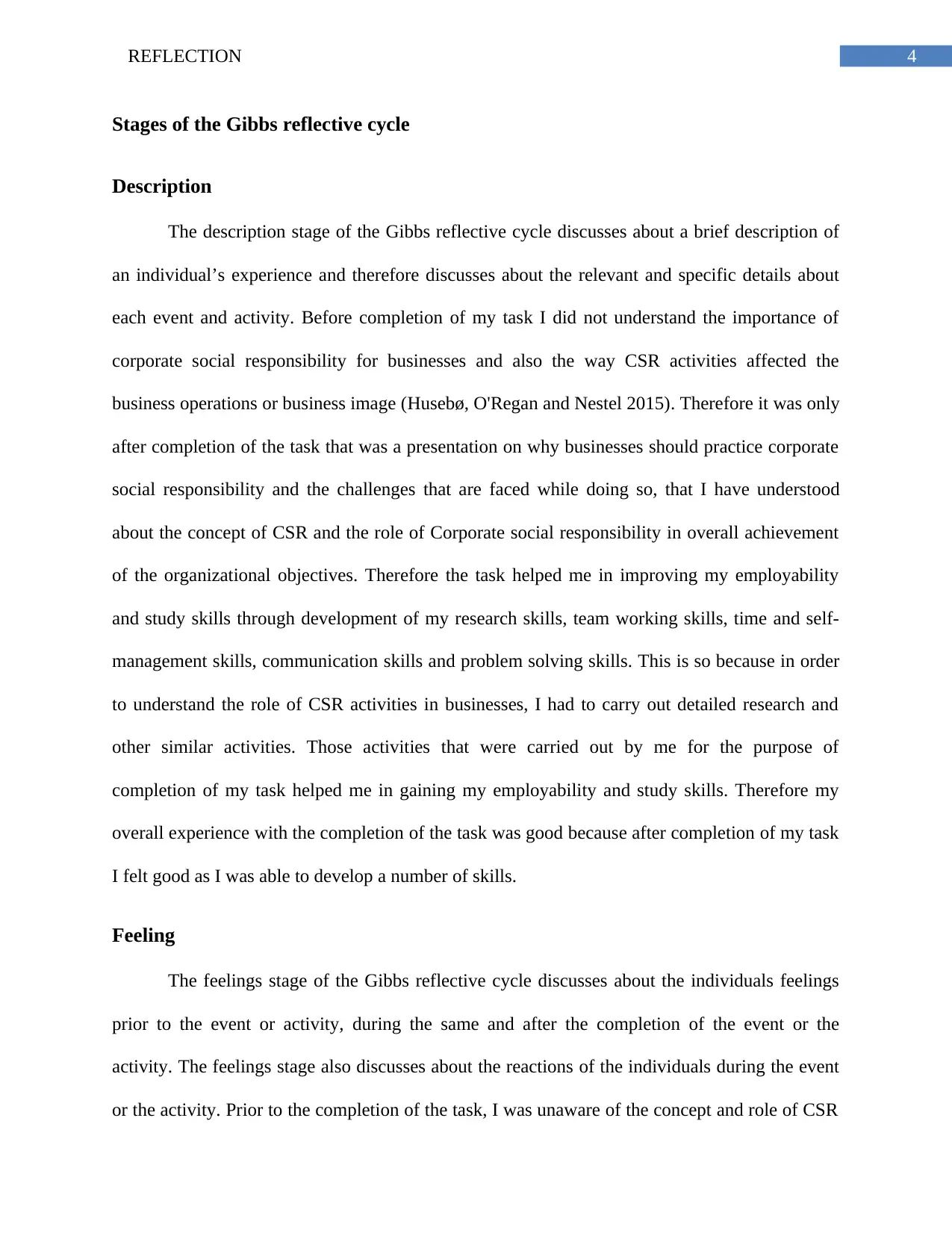
4REFLECTION
Stages of the Gibbs reflective cycle
Description
The description stage of the Gibbs reflective cycle discusses about a brief description of
an individual’s experience and therefore discusses about the relevant and specific details about
each event and activity. Before completion of my task I did not understand the importance of
corporate social responsibility for businesses and also the way CSR activities affected the
business operations or business image (Husebø, O'Regan and Nestel 2015). Therefore it was only
after completion of the task that was a presentation on why businesses should practice corporate
social responsibility and the challenges that are faced while doing so, that I have understood
about the concept of CSR and the role of Corporate social responsibility in overall achievement
of the organizational objectives. Therefore the task helped me in improving my employability
and study skills through development of my research skills, team working skills, time and self-
management skills, communication skills and problem solving skills. This is so because in order
to understand the role of CSR activities in businesses, I had to carry out detailed research and
other similar activities. Those activities that were carried out by me for the purpose of
completion of my task helped me in gaining my employability and study skills. Therefore my
overall experience with the completion of the task was good because after completion of my task
I felt good as I was able to develop a number of skills.
Feeling
The feelings stage of the Gibbs reflective cycle discusses about the individuals feelings
prior to the event or activity, during the same and after the completion of the event or the
activity. The feelings stage also discusses about the reactions of the individuals during the event
or the activity. Prior to the completion of the task, I was unaware of the concept and role of CSR
Stages of the Gibbs reflective cycle
Description
The description stage of the Gibbs reflective cycle discusses about a brief description of
an individual’s experience and therefore discusses about the relevant and specific details about
each event and activity. Before completion of my task I did not understand the importance of
corporate social responsibility for businesses and also the way CSR activities affected the
business operations or business image (Husebø, O'Regan and Nestel 2015). Therefore it was only
after completion of the task that was a presentation on why businesses should practice corporate
social responsibility and the challenges that are faced while doing so, that I have understood
about the concept of CSR and the role of Corporate social responsibility in overall achievement
of the organizational objectives. Therefore the task helped me in improving my employability
and study skills through development of my research skills, team working skills, time and self-
management skills, communication skills and problem solving skills. This is so because in order
to understand the role of CSR activities in businesses, I had to carry out detailed research and
other similar activities. Those activities that were carried out by me for the purpose of
completion of my task helped me in gaining my employability and study skills. Therefore my
overall experience with the completion of the task was good because after completion of my task
I felt good as I was able to develop a number of skills.
Feeling
The feelings stage of the Gibbs reflective cycle discusses about the individuals feelings
prior to the event or activity, during the same and after the completion of the event or the
activity. The feelings stage also discusses about the reactions of the individuals during the event
or the activity. Prior to the completion of the task, I was unaware of the concept and role of CSR
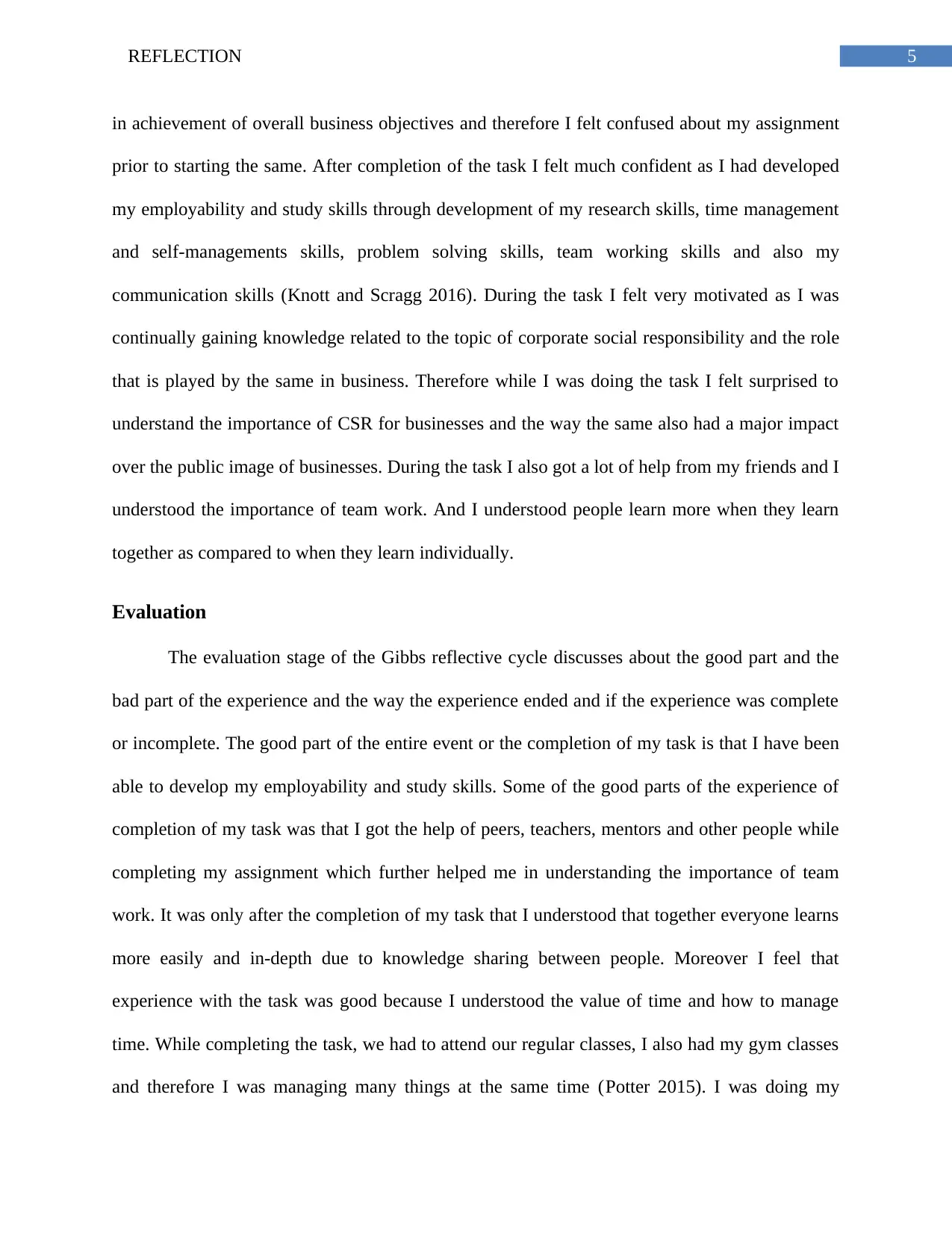
5REFLECTION
in achievement of overall business objectives and therefore I felt confused about my assignment
prior to starting the same. After completion of the task I felt much confident as I had developed
my employability and study skills through development of my research skills, time management
and self-managements skills, problem solving skills, team working skills and also my
communication skills (Knott and Scragg 2016). During the task I felt very motivated as I was
continually gaining knowledge related to the topic of corporate social responsibility and the role
that is played by the same in business. Therefore while I was doing the task I felt surprised to
understand the importance of CSR for businesses and the way the same also had a major impact
over the public image of businesses. During the task I also got a lot of help from my friends and I
understood the importance of team work. And I understood people learn more when they learn
together as compared to when they learn individually.
Evaluation
The evaluation stage of the Gibbs reflective cycle discusses about the good part and the
bad part of the experience and the way the experience ended and if the experience was complete
or incomplete. The good part of the entire event or the completion of my task is that I have been
able to develop my employability and study skills. Some of the good parts of the experience of
completion of my task was that I got the help of peers, teachers, mentors and other people while
completing my assignment which further helped me in understanding the importance of team
work. It was only after the completion of my task that I understood that together everyone learns
more easily and in-depth due to knowledge sharing between people. Moreover I feel that
experience with the task was good because I understood the value of time and how to manage
time. While completing the task, we had to attend our regular classes, I also had my gym classes
and therefore I was managing many things at the same time (Potter 2015). I was doing my
in achievement of overall business objectives and therefore I felt confused about my assignment
prior to starting the same. After completion of the task I felt much confident as I had developed
my employability and study skills through development of my research skills, time management
and self-managements skills, problem solving skills, team working skills and also my
communication skills (Knott and Scragg 2016). During the task I felt very motivated as I was
continually gaining knowledge related to the topic of corporate social responsibility and the role
that is played by the same in business. Therefore while I was doing the task I felt surprised to
understand the importance of CSR for businesses and the way the same also had a major impact
over the public image of businesses. During the task I also got a lot of help from my friends and I
understood the importance of team work. And I understood people learn more when they learn
together as compared to when they learn individually.
Evaluation
The evaluation stage of the Gibbs reflective cycle discusses about the good part and the
bad part of the experience and the way the experience ended and if the experience was complete
or incomplete. The good part of the entire event or the completion of my task is that I have been
able to develop my employability and study skills. Some of the good parts of the experience of
completion of my task was that I got the help of peers, teachers, mentors and other people while
completing my assignment which further helped me in understanding the importance of team
work. It was only after the completion of my task that I understood that together everyone learns
more easily and in-depth due to knowledge sharing between people. Moreover I feel that
experience with the task was good because I understood the value of time and how to manage
time. While completing the task, we had to attend our regular classes, I also had my gym classes
and therefore I was managing many things at the same time (Potter 2015). I was doing my
⊘ This is a preview!⊘
Do you want full access?
Subscribe today to unlock all pages.

Trusted by 1+ million students worldwide
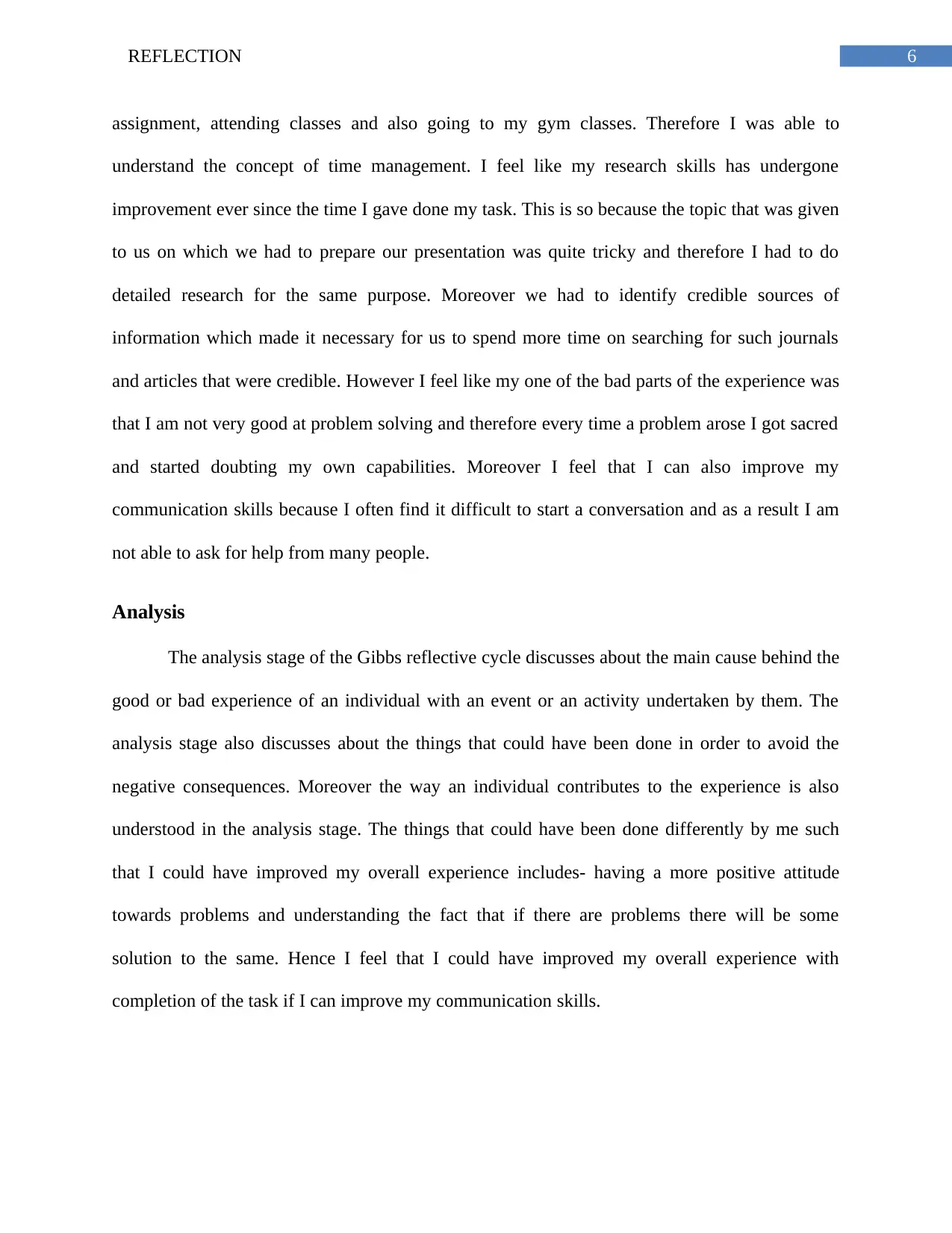
6REFLECTION
assignment, attending classes and also going to my gym classes. Therefore I was able to
understand the concept of time management. I feel like my research skills has undergone
improvement ever since the time I gave done my task. This is so because the topic that was given
to us on which we had to prepare our presentation was quite tricky and therefore I had to do
detailed research for the same purpose. Moreover we had to identify credible sources of
information which made it necessary for us to spend more time on searching for such journals
and articles that were credible. However I feel like my one of the bad parts of the experience was
that I am not very good at problem solving and therefore every time a problem arose I got sacred
and started doubting my own capabilities. Moreover I feel that I can also improve my
communication skills because I often find it difficult to start a conversation and as a result I am
not able to ask for help from many people.
Analysis
The analysis stage of the Gibbs reflective cycle discusses about the main cause behind the
good or bad experience of an individual with an event or an activity undertaken by them. The
analysis stage also discusses about the things that could have been done in order to avoid the
negative consequences. Moreover the way an individual contributes to the experience is also
understood in the analysis stage. The things that could have been done differently by me such
that I could have improved my overall experience includes- having a more positive attitude
towards problems and understanding the fact that if there are problems there will be some
solution to the same. Hence I feel that I could have improved my overall experience with
completion of the task if I can improve my communication skills.
assignment, attending classes and also going to my gym classes. Therefore I was able to
understand the concept of time management. I feel like my research skills has undergone
improvement ever since the time I gave done my task. This is so because the topic that was given
to us on which we had to prepare our presentation was quite tricky and therefore I had to do
detailed research for the same purpose. Moreover we had to identify credible sources of
information which made it necessary for us to spend more time on searching for such journals
and articles that were credible. However I feel like my one of the bad parts of the experience was
that I am not very good at problem solving and therefore every time a problem arose I got sacred
and started doubting my own capabilities. Moreover I feel that I can also improve my
communication skills because I often find it difficult to start a conversation and as a result I am
not able to ask for help from many people.
Analysis
The analysis stage of the Gibbs reflective cycle discusses about the main cause behind the
good or bad experience of an individual with an event or an activity undertaken by them. The
analysis stage also discusses about the things that could have been done in order to avoid the
negative consequences. Moreover the way an individual contributes to the experience is also
understood in the analysis stage. The things that could have been done differently by me such
that I could have improved my overall experience includes- having a more positive attitude
towards problems and understanding the fact that if there are problems there will be some
solution to the same. Hence I feel that I could have improved my overall experience with
completion of the task if I can improve my communication skills.
Paraphrase This Document
Need a fresh take? Get an instant paraphrase of this document with our AI Paraphraser
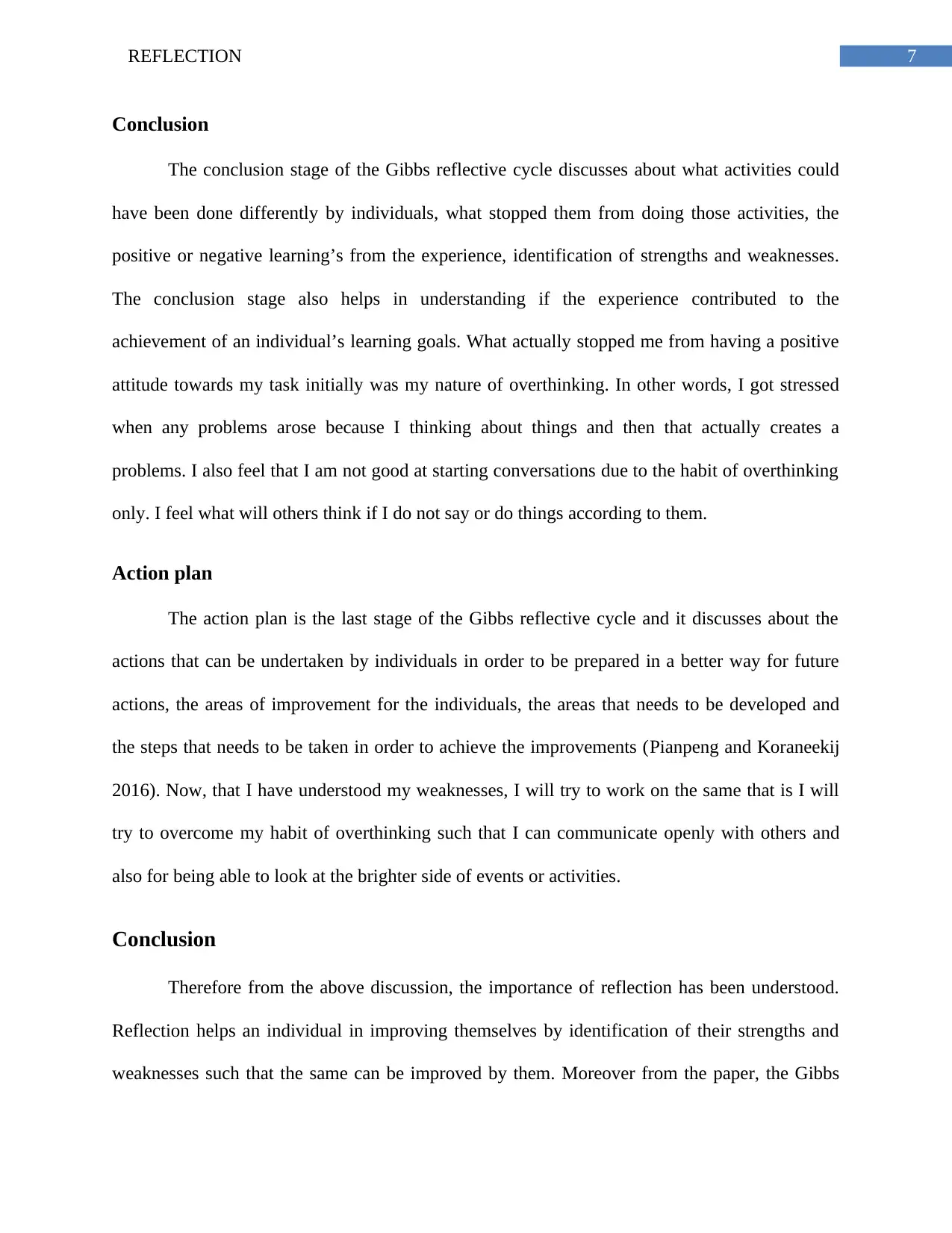
7REFLECTION
Conclusion
The conclusion stage of the Gibbs reflective cycle discusses about what activities could
have been done differently by individuals, what stopped them from doing those activities, the
positive or negative learning’s from the experience, identification of strengths and weaknesses.
The conclusion stage also helps in understanding if the experience contributed to the
achievement of an individual’s learning goals. What actually stopped me from having a positive
attitude towards my task initially was my nature of overthinking. In other words, I got stressed
when any problems arose because I thinking about things and then that actually creates a
problems. I also feel that I am not good at starting conversations due to the habit of overthinking
only. I feel what will others think if I do not say or do things according to them.
Action plan
The action plan is the last stage of the Gibbs reflective cycle and it discusses about the
actions that can be undertaken by individuals in order to be prepared in a better way for future
actions, the areas of improvement for the individuals, the areas that needs to be developed and
the steps that needs to be taken in order to achieve the improvements (Pianpeng and Koraneekij
2016). Now, that I have understood my weaknesses, I will try to work on the same that is I will
try to overcome my habit of overthinking such that I can communicate openly with others and
also for being able to look at the brighter side of events or activities.
Conclusion
Therefore from the above discussion, the importance of reflection has been understood.
Reflection helps an individual in improving themselves by identification of their strengths and
weaknesses such that the same can be improved by them. Moreover from the paper, the Gibbs
Conclusion
The conclusion stage of the Gibbs reflective cycle discusses about what activities could
have been done differently by individuals, what stopped them from doing those activities, the
positive or negative learning’s from the experience, identification of strengths and weaknesses.
The conclusion stage also helps in understanding if the experience contributed to the
achievement of an individual’s learning goals. What actually stopped me from having a positive
attitude towards my task initially was my nature of overthinking. In other words, I got stressed
when any problems arose because I thinking about things and then that actually creates a
problems. I also feel that I am not good at starting conversations due to the habit of overthinking
only. I feel what will others think if I do not say or do things according to them.
Action plan
The action plan is the last stage of the Gibbs reflective cycle and it discusses about the
actions that can be undertaken by individuals in order to be prepared in a better way for future
actions, the areas of improvement for the individuals, the areas that needs to be developed and
the steps that needs to be taken in order to achieve the improvements (Pianpeng and Koraneekij
2016). Now, that I have understood my weaknesses, I will try to work on the same that is I will
try to overcome my habit of overthinking such that I can communicate openly with others and
also for being able to look at the brighter side of events or activities.
Conclusion
Therefore from the above discussion, the importance of reflection has been understood.
Reflection helps an individual in improving themselves by identification of their strengths and
weaknesses such that the same can be improved by them. Moreover from the paper, the Gibbs
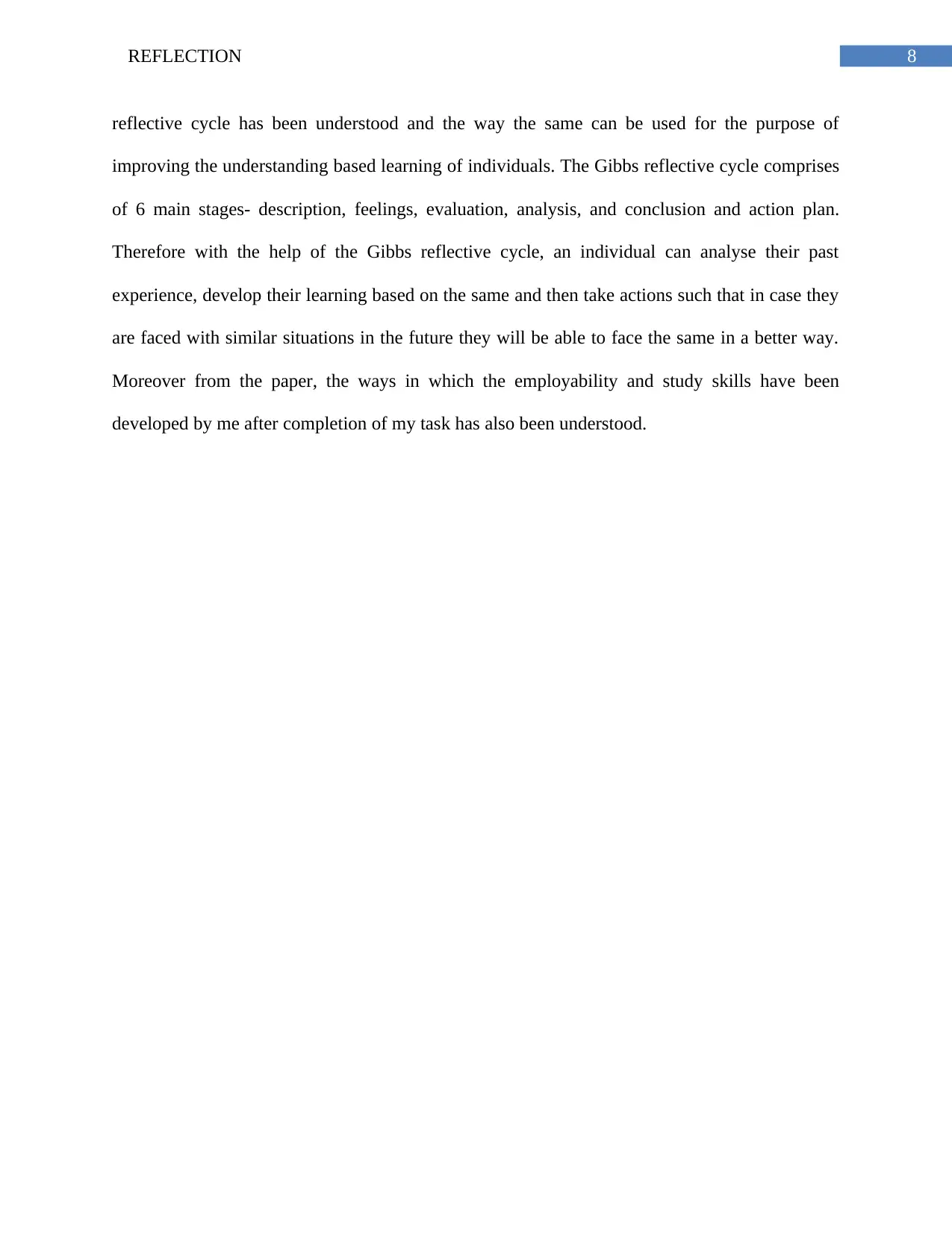
8REFLECTION
reflective cycle has been understood and the way the same can be used for the purpose of
improving the understanding based learning of individuals. The Gibbs reflective cycle comprises
of 6 main stages- description, feelings, evaluation, analysis, and conclusion and action plan.
Therefore with the help of the Gibbs reflective cycle, an individual can analyse their past
experience, develop their learning based on the same and then take actions such that in case they
are faced with similar situations in the future they will be able to face the same in a better way.
Moreover from the paper, the ways in which the employability and study skills have been
developed by me after completion of my task has also been understood.
reflective cycle has been understood and the way the same can be used for the purpose of
improving the understanding based learning of individuals. The Gibbs reflective cycle comprises
of 6 main stages- description, feelings, evaluation, analysis, and conclusion and action plan.
Therefore with the help of the Gibbs reflective cycle, an individual can analyse their past
experience, develop their learning based on the same and then take actions such that in case they
are faced with similar situations in the future they will be able to face the same in a better way.
Moreover from the paper, the ways in which the employability and study skills have been
developed by me after completion of my task has also been understood.
⊘ This is a preview!⊘
Do you want full access?
Subscribe today to unlock all pages.

Trusted by 1+ million students worldwide
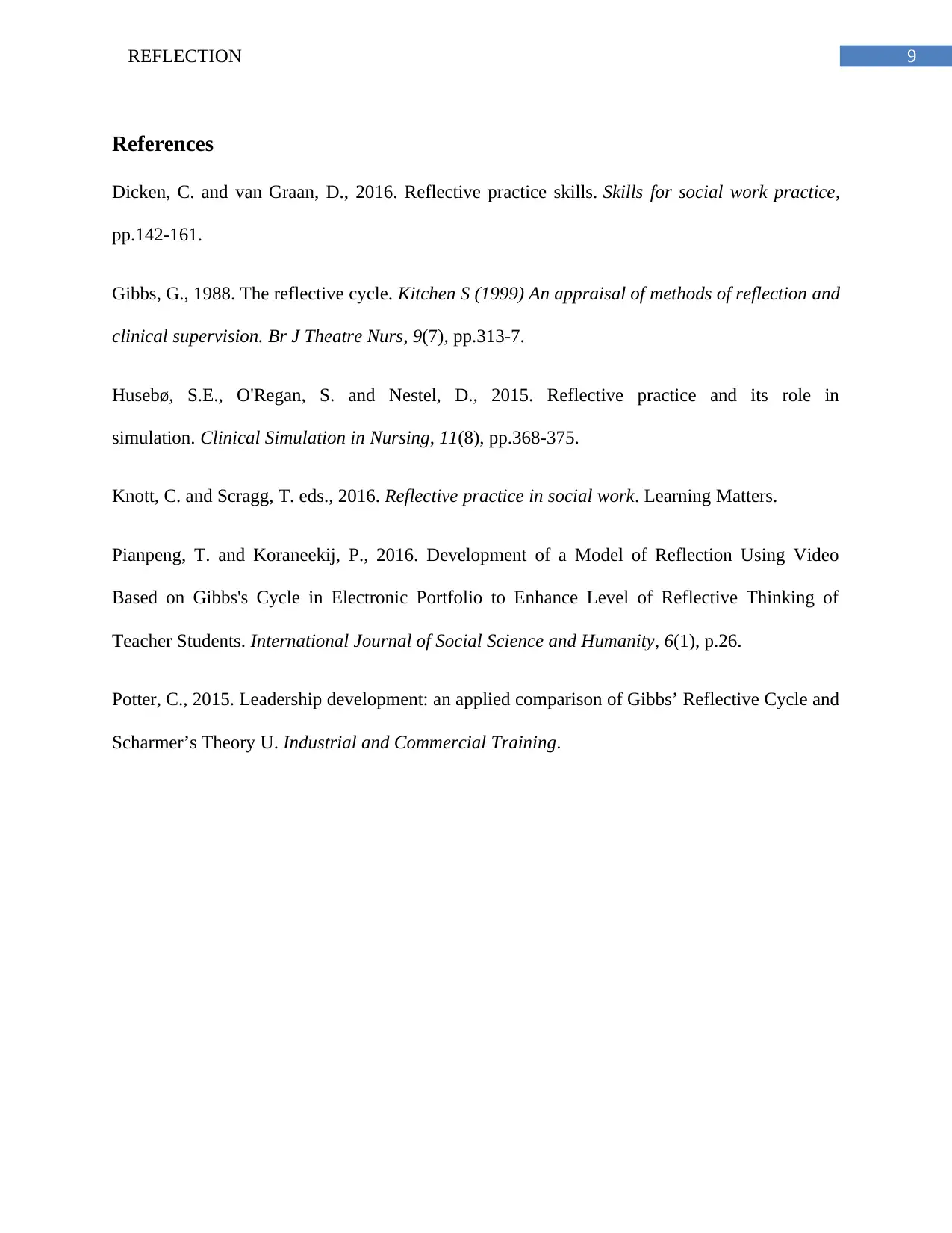
9REFLECTION
References
Dicken, C. and van Graan, D., 2016. Reflective practice skills. Skills for social work practice,
pp.142-161.
Gibbs, G., 1988. The reflective cycle. Kitchen S (1999) An appraisal of methods of reflection and
clinical supervision. Br J Theatre Nurs, 9(7), pp.313-7.
Husebø, S.E., O'Regan, S. and Nestel, D., 2015. Reflective practice and its role in
simulation. Clinical Simulation in Nursing, 11(8), pp.368-375.
Knott, C. and Scragg, T. eds., 2016. Reflective practice in social work. Learning Matters.
Pianpeng, T. and Koraneekij, P., 2016. Development of a Model of Reflection Using Video
Based on Gibbs's Cycle in Electronic Portfolio to Enhance Level of Reflective Thinking of
Teacher Students. International Journal of Social Science and Humanity, 6(1), p.26.
Potter, C., 2015. Leadership development: an applied comparison of Gibbs’ Reflective Cycle and
Scharmer’s Theory U. Industrial and Commercial Training.
References
Dicken, C. and van Graan, D., 2016. Reflective practice skills. Skills for social work practice,
pp.142-161.
Gibbs, G., 1988. The reflective cycle. Kitchen S (1999) An appraisal of methods of reflection and
clinical supervision. Br J Theatre Nurs, 9(7), pp.313-7.
Husebø, S.E., O'Regan, S. and Nestel, D., 2015. Reflective practice and its role in
simulation. Clinical Simulation in Nursing, 11(8), pp.368-375.
Knott, C. and Scragg, T. eds., 2016. Reflective practice in social work. Learning Matters.
Pianpeng, T. and Koraneekij, P., 2016. Development of a Model of Reflection Using Video
Based on Gibbs's Cycle in Electronic Portfolio to Enhance Level of Reflective Thinking of
Teacher Students. International Journal of Social Science and Humanity, 6(1), p.26.
Potter, C., 2015. Leadership development: an applied comparison of Gibbs’ Reflective Cycle and
Scharmer’s Theory U. Industrial and Commercial Training.
1 out of 10
Related Documents
Your All-in-One AI-Powered Toolkit for Academic Success.
+13062052269
info@desklib.com
Available 24*7 on WhatsApp / Email
![[object Object]](/_next/static/media/star-bottom.7253800d.svg)
Unlock your academic potential
Copyright © 2020–2026 A2Z Services. All Rights Reserved. Developed and managed by ZUCOL.



![Employability Skills: Reflective Review Report - [University Name]](/_next/image/?url=https%3A%2F%2Fdesklib.com%2Fmedia%2Fimages%2Fdl%2F4063ff1d0314456fbe76b73fdd2697f7.jpg&w=256&q=75)

